15 Signs You're Eating Too Many Calories

Is eating too many calories taking a toll on your health and wellness? "It takes about 20 minutes for your brain to send a signal to the stomach to let you know that you're full. Overeating occurs when you continue to eat beyond this point of fullness," research dietitian Erma Levy tells MD Anderson. Here are 15 signs and symptoms of eating too much food.
Low-Energy
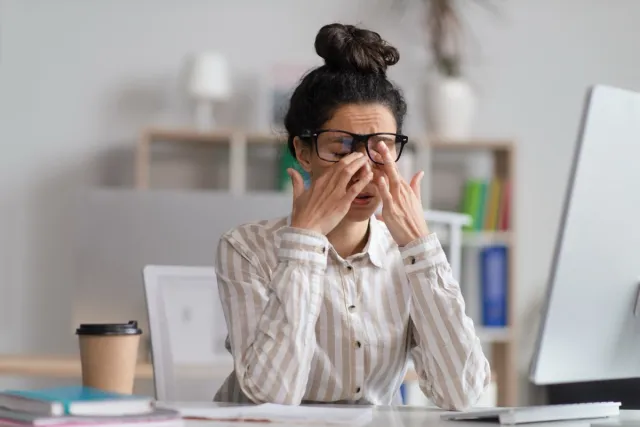
Feeling sluggish after a meal could be a sign of overeating. "Overeating makes your body work harder and redirects blood flow away from other organs to your busy digestive system," says the Cleveland Clinic. "This can make you feel tired or sluggish. The foods we're more likely to overeat also tend to be higher in carbohydrates, which can cause a sugar rush followed by a sugar crash."
Heartburn

Heartburn is a common symptom of eating too much. "To break down food, the stomach produces hydrochloric acid," Levy explains. "If you overeat, this acid may back up into the esophagus resulting in heartburn. Consuming too much food that is high in fat, like pizza and cheeseburgers, may make you more susceptible to heartburn."
Bloating
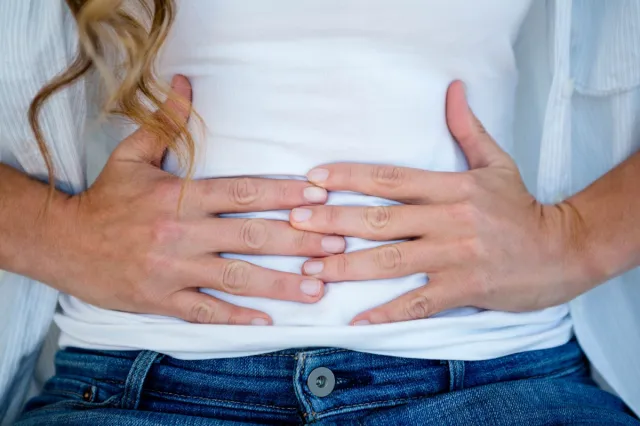
Eating too much food can cause bloating. "If you get a bloated stomach after eating, it may be a digestive issue," says the Cleveland Clinic. "It might be as simple as eating too much too fast, or you could have a food intolerance or other condition that causes gas and digestive contents to build up."
Poor Sleep

Eating too much can mess with your sleep. "Overeating can even impact your sleep," Levy says. "Your circadian clock, which controls your sleep cycles, causes your sleep and hunger hormone levels to rise and fall throughout the day. Overeating can upset this rhythm, making it hard for you to sleep through the night.
Hot and Sweaty
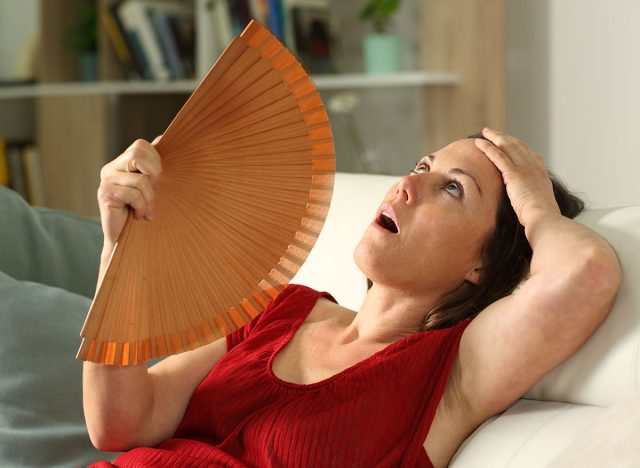
Eating too many calories can lead to hot flashes and feeling sweaty. Eating spicy food can have the same effect as digestion increases body temperature.
Gas

Too many calories can cause digestive issues including gas. "Too much lower intestinal gas can be caused by eating too much of certain foods or not being able to fully digest certain foods," says the Mayo Clinic. "It also can be from a change in the bacteria found in the colon."
Nausea

Nausea could be a symptom of eating too much in one sitting. "Eating too much food can cause you to feel uncomfortable and nauseated," Jenilee Matz, MPH, tells Walgreens. "When you overeat, the stomach expands to make room for excess food. The larger stomach can put pressure on nearby organs, which can cause discomfort. It may also lead to heartburn, gas and bloating, especially if the foods you ate were high in fat because they take longer to digest."
Type 2 Diabetes
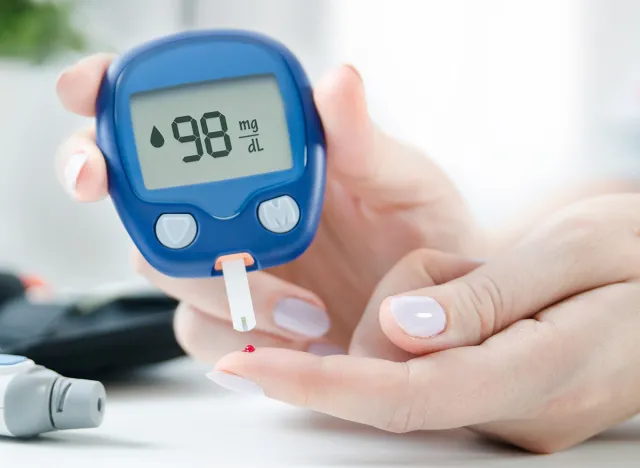
Eating too much can lead to type 2 diabetes. "Over the course of weeks to months to years, overeating can affect your cholesterol and could potentially impact your blood sugar management, which can put you at risk for developing type 2 diabetes and heart disease," wellness dietician Kylie Arrindell tells Houston Methodist.
RELATED: 20 Effective Techniques to Reduce Your Body Fat
Embarrassed About Food

Feeling depressed or distressed about food could be a result of overeating. "If you overeat, you may feel embarrassed or distressed after finishing a meal," says UPMC Healthbeat. "People who overeat may feel that they lack control over what and how much they consume. A history of failed diets also could indicate that you struggle with overeating."
Always Feeling Full

If you're constantly snacking and never reach mealtimes genuinely hungry, you could be overeating. "Overeating occasionally will not make you gain weight overnight, but chronic bouts of excess eating are a different story," Julia Zakrzewski, RD, tells Nourish. "These eating patterns can make it difficult for you to recognize your hunger and satiety cues."
Heart Disease

Eating more calories than you need could lead to heart disease. "If you usually eat more calories than you can burn off, you raise your risk of gaining weight and storing more body fat," according to UPMC Healthbeat. People who are overweight or obese have a higher risk of metabolic syndrome, a group of conditions linked to heart disease."
Food Loses Taste
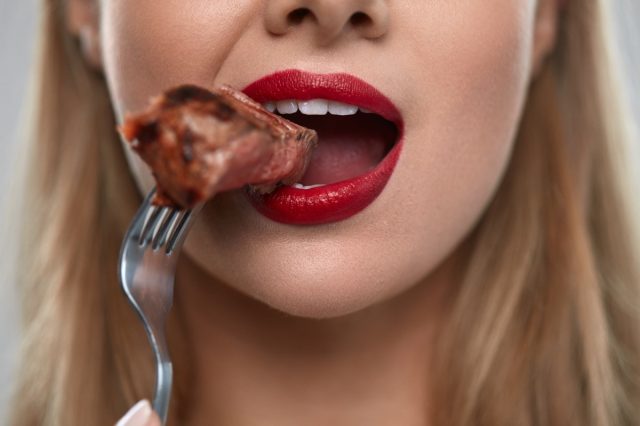
Foods that you once loved may not seem as nice anymore. "The meal no longer has the same appealing taste as your first bite," Zakrzewski says.
RELATED: Top 5 "Healthy" Foods Bad For Your Weight Loss, Says Jillian Michaels
Belly Fat

Excess belly fat is one of the signs of overeating. "That extra belly fat does more than just make it hard to zip up a favorite pair of jeans, though," says the Mayo Clinic. "Research shows that belly fat carries serious health risks. People who regularly eat and drink more calories than they burn each day are more likely to gain extra weight, including belly fat."
Binge Eating

"Frequent overeating may indicate binge eating disorder (BED)," says UPMC HealthBeat. "Common signs of BED include eating faster than normal, eating until you're uncomfortably full, eating alone often, or consuming large amounts of food when you're not hungry."
RELATED: I Lost Over 130 Pounds in 13 Months Through Strength Training
Weight Gain

If overeating is causing uncontrollable weight gain, consider seeing a professional to help understand what might be causing it. "Whatever emotions drive you to overeat, the end result is often the same," says the Mayo Clinic. "The effect is temporary, the emotions return and you likely then bear the additional burden of guilt about setting back your weight-loss goal. This can also lead to an unhealthy cycle — your emotions trigger you to overeat, you beat yourself up for getting off your weight-loss track, you feel bad and you overeat again." And if you enjoyed this article, take advantage of these 15 Quick Ways to Lose Body Fat Percentage in a Week.




